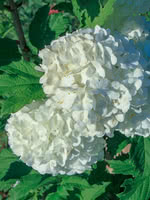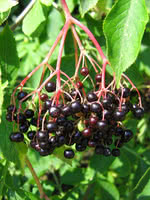Mon-Fri 9am - 5pm Mountain time
Snowball Viburnum vs Black Elderberry
Viburnum opulus roseum
Sambucus canadensis
NOT AVAILABLE THIS SEASON - MIGHT RETURN
Snowball Viburnum is a popular ornamental shrub with prolific flowering. This plant is prized for its round clusters of white flowers that resemble snowballs, delighting children and adults. In fall, its leaves turn vibrant shades of red.
Snowball Viburnum is sought after as a single accent shrub, but can also make a dense hedge or privacy screen.
Black Elderberry is a deciduous shrub native to eastern North America. You can plant this shrub in moist areas and it will help stabilize your soil. You can also use it on rural properties anywhere you'd use a lilac.
Black Elderberries are considered to be partially self-pollinating. So while they will still produce some berries without cross-pollination, planting with another variety will increase yields. Consider planting with Ranch Elderberry or Bob Gordon Elderberry.
Warning: the seeds, stems, leaves, roots, and uncooked berries of the Black Elderberry are poisonous to humans when eaten in quantity. You should cook the berries to make them safe for human consumption.
Snowball Viburnum Quick Facts
Black Elderberry Quick Facts
Toxicity: leaves, stems, and uncooked berries are poisonous to humans

